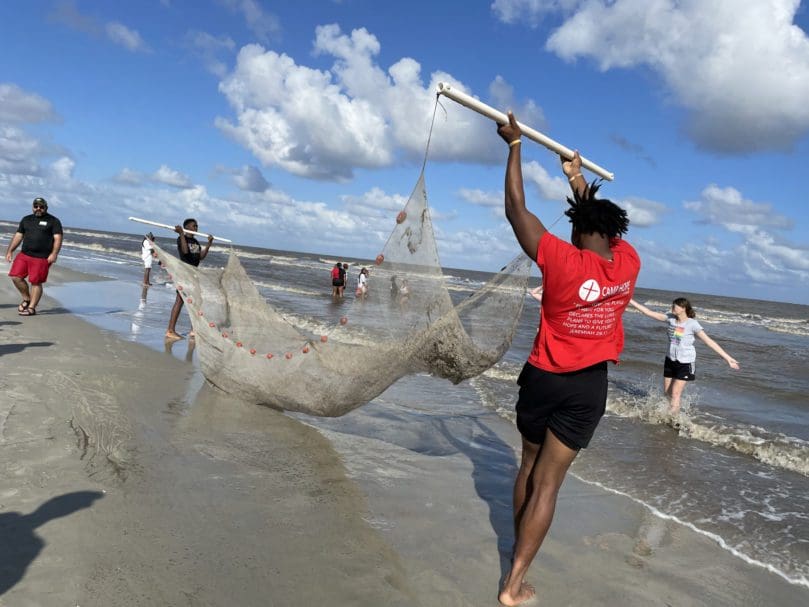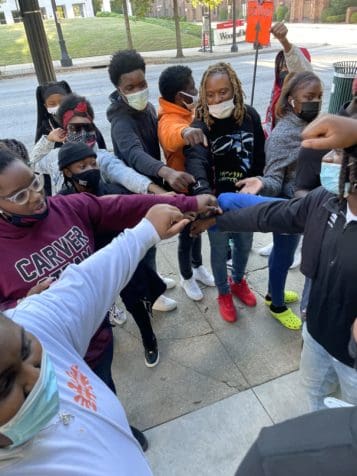 Photo Courtesy of Kidz2Leaders
Photo Courtesy of Kidz2LeadersAtlanta
Notre Dame’s anti-poverty lab launches Atlanta project
By NICHOLE GOLDEN, Staff Writer | Published January 4, 2022
ATLANTA—The University of Notre Dame’s anti-poverty research lab is teaming up with five nonprofits who work with Atlanta’s most vulnerable.
The Wilson Sheehan Lab for Economic Opportunities (LEO) at the University of Notre Dame launched a partnership in Atlanta in early November to help organizations working with the poor to measure impact using scientific evaluation methods.
LEO pairs researchers with leaders in the social services sector to identify innovative and scalable programs and policies that help people move permanently out of poverty. The lab uses a cohort model to train organizations in impact evaluations and then works closely with them to design, launch and share what was learned.
LEO’s Atlanta project is the first city-based cohort. The research is conducted free of charge.
Atlanta nonprofits selected for the 16-week project are First Step Staffing, the Gateway Center, Goodwill of North Georgia, Kidz2Leaders and Next Generation Men and Women.
The Atlanta providers
Christina Cummings has been executive director of Kidz2Leaders for nine years.
“We serve kids with incarcerated parents,” she said.
The organization works to end generational incarceration and promote a life of self-sufficiency via its Camp Hope summer camp and other programming, with goals of reducing criminal justice involvement, increasing educational progress and housing stability.
Cummings said the chance to participate in the LEO cohort is so valuable.
“It can be so overwhelming to network,” she said.
The pandemic presented challenges to Kidz2Leaders as its overnight camps were no longer feasible. Camp Hope builds community among the children and offers new experiences.
In addition to teaching basic Christian principles to students, the nonprofit has switched gears to offer more guardian and parent support.
They serve families for up to 10 years culminating with job training and support programs. A struggle is studying long term outcomes among those served “because there is a lack of data,” said Cummings. “We’ve wanted to do a program evaluation.”
She is pleased it’s Notre Dame’s lab that will be accompanying them to evaluate impact.
“It’s a trusted institution,” she said.

High school students served by Next Generation Men and Women enjoyed a recent Exposure Experiences trip. The students from Title 1, underserved high schools in Atlanta and Fulton County receive mentoring, exposure to career and educational options and internships. The nonprofit has 400 students registered this year and is participating in the Notre Dame LEO project.
Next Generation Men and Women, also part of the cohort, mentors students at three Title 1 high schools.
In Atlanta, 20,000 children don’t receive needed mentoring, very little guidance counseling and have a lack of exposure to college and career options. Next Generation Men and Women sponsors monthly trips for the teens to showcase schools and places of work. There is a 98 percent high school graduation rate among the youth served.
Symone Gerren, Next Generation’s director of programs, says its mentors build four-year relationships with the kids, teaching them to see and believe their potential.
“This year, we have 400 students registered,” said Gerren.
Next Generation has a curriculum to help students navigate post-secondary education and career paths through summer enrichment or paid internships.
“It continues to arm them,” explained Gerren. “I love being part of tipping those scales a bit.”
While the staff doesn’t traditionally do house visits, the pandemic shifted services. They assembled care packages for the underserved youth and arranged meal delivery.
Next Generation is excited to collaborate with LEO to “get numbers behind the intervention.”
The LEO cohort requires a lot of commitment on the part of selected nonprofits, but Gerren said they are up for that challenge.
“We definitely plan to share with the community,” she said of the results. Next Generation hopes to scale what works to replicate the programs in Charlotte or Miami.
“It’s all to be able to do it better,” said Gerren.
A force for good
Ed Fisher, a 1983 Notre Dame graduate and Atlanta resident, is the project’s biggest booster.
Fisher welcomed community leaders to an informational session Nov. 2 to kick-off a two-day workshop for the nonprofits selected to participate.
There’s no doubt Fisher is grateful for the excellent education he received, but it’s the Notre Dame tradition of being a “Force for Good” that drives him.
“I’m most proud of being part of the mission of the school,” he said.
Fisher and his wife, Lori, are parishioners at the Cathedral of Christ the King, and he is president of SouthPoint Ventures.
He said the cohort launch is about recirculating the blessings.
“Atlanta has given me and my family so much,” he said.
Heather Reynolds, managing director of LEO; and Jim Sullivan, one of the lab’s founding economists, also shared program workings at the workshop.
Prior to LEO, there was no mechanism for bringing researchers and providers together, they said.
“People in poverty deserve more,” said Reynolds, who previously served as CEO of Catholic Charities Fort Worth.
Less than 2 percent of the groups LEO has worked with had conducted evaluations to measure the success of their services. Only one of the five Atlanta participants has undertaken an RCT or randomized controlled trial.
LEO’s research results will be accessible to all, noted Reynolds. It’s about following a “culture of evidence,” she said. The research design process culminates in a second workshop in March 2022 where organizations will present designs to academics, philanthropists and poverty thought leaders in Atlanta.
“We are excited to see what unfolds in the next 16 weeks as we work hand-in-hand with
these organizations to realize their dreams of building evidence around their good work,”
said Reynolds. “And I am most excited to look back 10 years from now and see what is different in our country because these five partners said ‘yes’ to doing research.”
Anyone interested in being considered for a future cohort may contact Fran Gallagher, LEO’s project development manager, at fkgallagher@nd.edu.